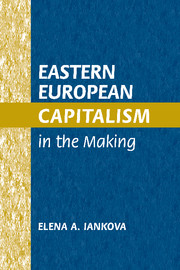Book contents
- Frontmatter
- Contents
- Acknowledgments
- List of Abbreviations
- 1 Hybrid Capitalism in the Making
- 2 The Corporatist Legacy of State Socialism
- 3 Bulgaria's National Tripartism
- 4 National Social Dialogue in Poland
- 5 The Politics of Sectoral Tripartism
- 6 The Politics of Regional Tripartism
- 7 Conclusions: Transiency and Continuity
- Tables
- References
- Index
5 - The Politics of Sectoral Tripartism
Published online by Cambridge University Press: 30 July 2009
- Frontmatter
- Contents
- Acknowledgments
- List of Abbreviations
- 1 Hybrid Capitalism in the Making
- 2 The Corporatist Legacy of State Socialism
- 3 Bulgaria's National Tripartism
- 4 National Social Dialogue in Poland
- 5 The Politics of Sectoral Tripartism
- 6 The Politics of Regional Tripartism
- 7 Conclusions: Transiency and Continuity
- Tables
- References
- Index
Summary
Sectoral Tripartism in Bulgaria
Sectoral tripartism in Bulgaria emerged as an integral part of national social dialogue, and stretched to the company level as well. In January 1991, to reduce the overwhelming, dense direct involvement of the state and the national social partners in the resolution of local problems, the social partners negotiated with the Agreement for Preservation of Social Peace the development of social dialogue at lower sectoral and regional levels, to complement the activities of the National Standing Tripartite Commission for Coordination of Interests (created in January 1991). Based on the Agreement for Preservation of Social Peace and the statute of this commission, a special government decree required all sectoral ministries and local government structures to initiate the creation of sectoral and regional sub-commissions for coordination of interests. The new Labor Code of 1993 mandated the creation of tripartite bodies for social dialogue in all industries and branches of the national economy, and the development of collective bargaining at the enterprise level and at sectoral and industry levels. Tripartite sectoral agreements then began to be signed in each sectoral ministry, and by the end of 1994, sectoral tripartite forums were functioning at each ministry. At some bigger ministries, such as the Ministry of Industry, more than one tripartite body was created, each dealing with issues of its subsector.
- Type
- Chapter
- Information
- Eastern European Capitalism in the Making , pp. 123 - 147Publisher: Cambridge University PressPrint publication year: 2002



